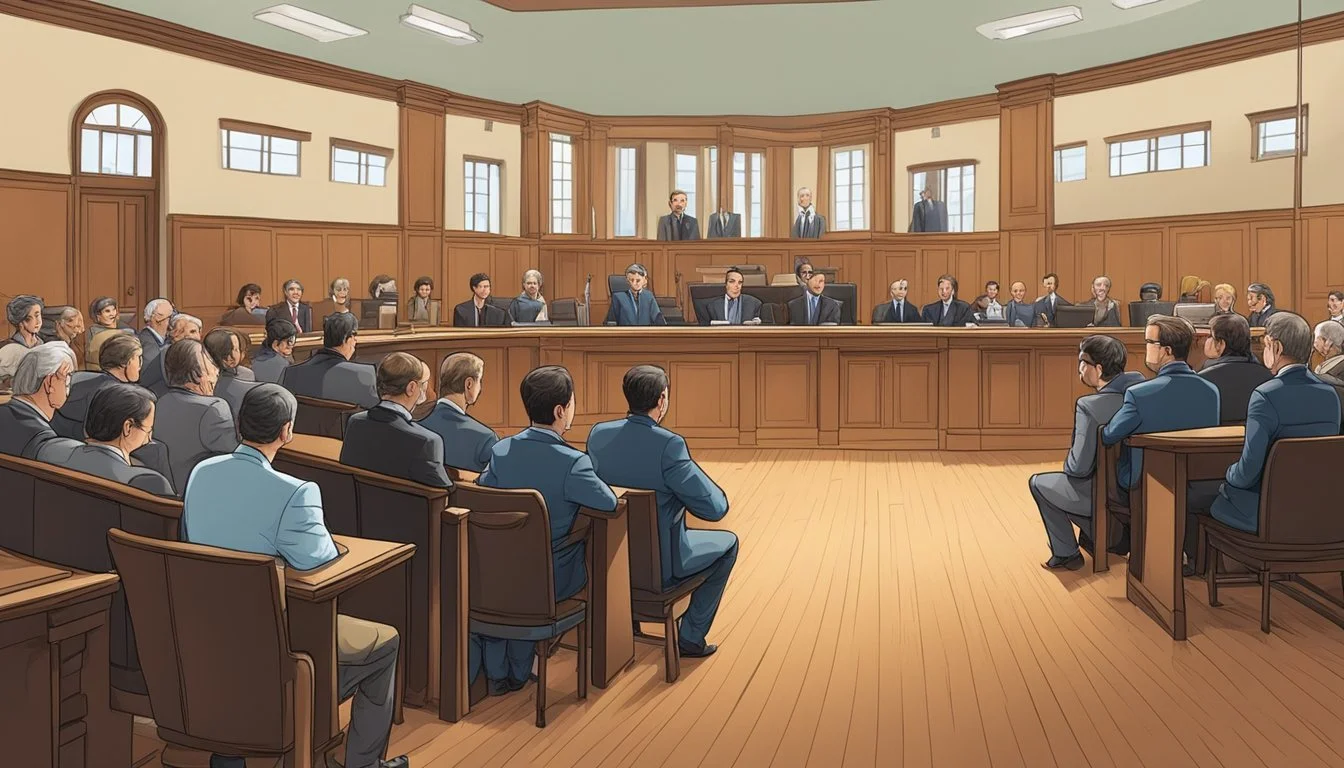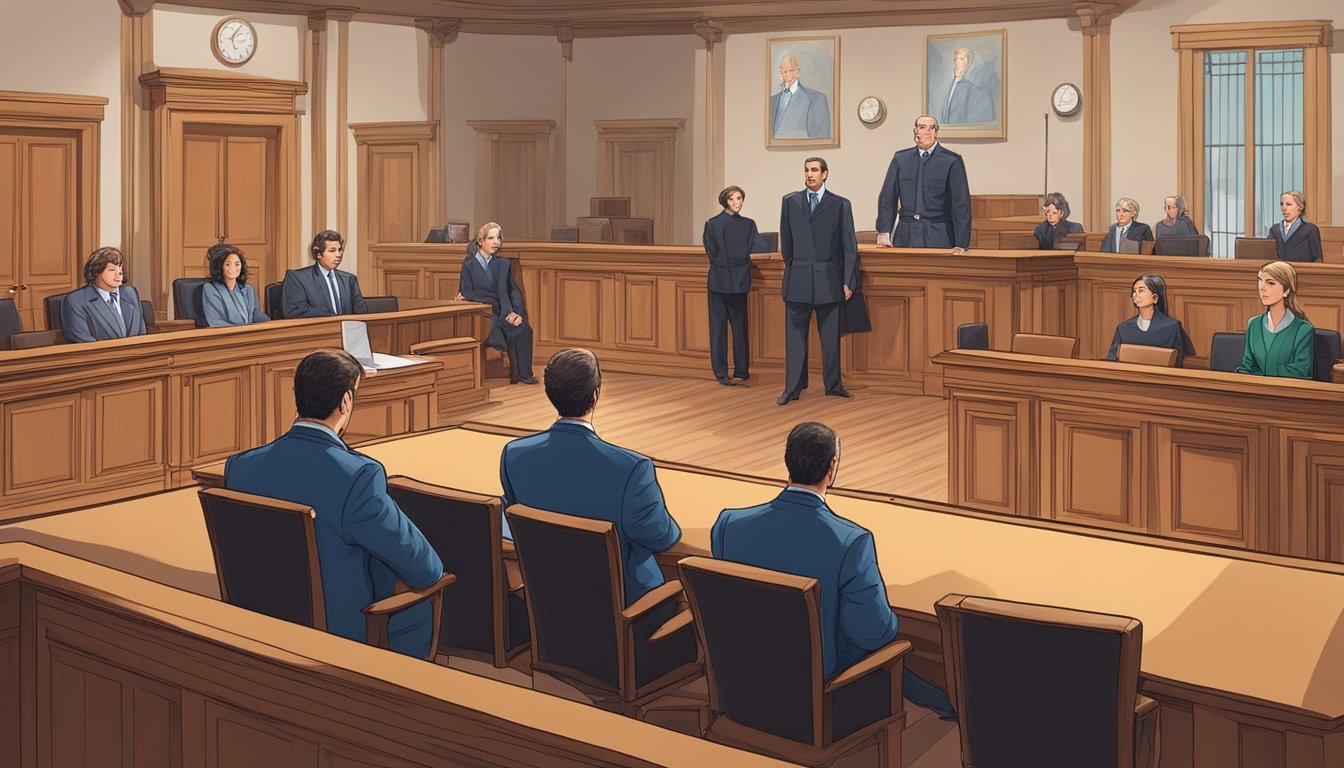Unraveling the Shocking Crime That Captivated a Nation
New Evidence Resurfaces 30 Years Later
The Menendez Brothers case has captivated true crime enthusiasts for decades. In 1989, Lyle and Erik Menendez were convicted of murdering their wealthy parents in their Beverly Hills mansion. Netflix's new documentary "The Menendez Brothers" offers a fresh perspective on this notorious case, featuring interviews with the brothers themselves.
This true crime documentary delves into the shocking events and subsequent trials that gripped the nation. Directed by Alejandro Hartmann, the film provides viewers with an opportunity to hear directly from Lyle and Erik Menendez as they share their side of the story years after their conviction.
The documentary explores the complex family dynamics, allegations of abuse, and the sensational media coverage that surrounded the case. It aims to present a comprehensive look at the circumstances leading up to the murders and the lasting impact on all involved. By examining this infamous true crime story, viewers may gain new insights into one of the most talked-about cases in American legal history.
Origins and Background
The Menendez brothers' story began in a seemingly idyllic family setting that masked dark undercurrents. Their privileged upbringing and complex family dynamics set the stage for a tragic event that would shock the nation.
Family Dynamics
The Menendez family presented an image of success and affluence. José and Kitty Menendez raised their sons Lyle and Erik in Beverly Hills, surrounded by wealth and opportunity. Behind closed doors, the family atmosphere was tense and demanding.
José, a Cuban immigrant, built a successful entertainment industry career. He pushed his sons relentlessly to excel, creating an environment of high pressure and expectations. Kitty, often described as emotionally distant, struggled with her own personal issues.
The brothers formed a close bond, united by their shared experiences within the family. This relationship would later become a crucial element in their defense strategy during the murder trial.
Early Life and Education
Lyle and Erik Menendez attended prestigious schools and enjoyed many privileges. They participated in sports and other extracurricular activities, seemingly living the American dream.
Lyle, the older brother, attended Princeton University briefly before being suspended for academic dishonesty. Erik showed promise as a tennis player and aspired to a professional career in the sport.
Despite their outward achievements, both brothers reportedly struggled with emotional issues and feelings of inadequacy. Their privileged upbringing did not shield them from internal conflicts and pressures.
José and Kitty Menendez
José Menendez rose from humble beginnings to become a successful executive in the music and film industries. He was known for his ambition, work ethic, and demanding nature.
Kitty Menendez, born Mary Louise Andersen, came from a middle-class background. She met José in college and supported his career aspirations. As the family's wealth grew, Kitty reportedly battled depression and substance abuse issues.
The couple's relationship was reportedly strained, with allegations of infidelity on José's part. Their parenting style, particularly José's, was described as strict and sometimes abusive, a claim that would become central to their sons' defense in the murder trial.
The Crime
The Menendez brothers' case shocked the nation with its brutal violence and allegations of familial abuse. This high-profile crime unfolded in a wealthy Beverly Hills mansion, captivating public attention and sparking intense media coverage.
Murder Details
On August 20, 1989, Lyle and Erik Menendez brutally murdered their parents, Jose and Kitty Menendez, in their Beverly Hills home. The brothers used shotguns to kill their father and mother, firing multiple times at close range. Jose was shot in the back of the head while sitting on the couch, while Kitty was shot several times as she tried to escape.
The crime scene was particularly gruesome, with the parents' bodies found in the den of their mansion. Both victims suffered multiple gunshot wounds, leaving no chance of survival.
Investigation Timeline
The investigation into the Menendez murders began immediately after the brothers called 911 to report finding their parents' bodies. Initially, police suspected a mob hit due to Jose Menendez's business dealings.
Key events in the investigation:
August 20, 1989: Murder occurs
October 1989: Police begin to suspect the brothers
March 1990: Erik confesses to his psychologist
March 8, 1990: Lyle arrested
March 11, 1990: Erik surrenders to police
The brothers' lavish spending after their parents' deaths raised suspicions and ultimately led to their arrests.
Media Circus
The Menendez case quickly became a media sensation, dominating headlines and TV coverage. The combination of wealth, family drama, and shocking violence captivated the public.
Television cameras were allowed in the courtroom during the trials, turning the proceedings into a national spectacle. Major networks provided extensive coverage, with legal commentators dissecting every detail.
The case spawned numerous books, TV movies, and documentaries. It became a cultural touchstone, inspiring debates about wealth, family dysfunction, and the American justice system.
The media frenzy surrounding the Menendez brothers' case set a precedent for high-profile criminal trials in the modern era.
Legal Proceedings
The Menendez brothers' case involved complex legal proceedings that captivated the public. Multiple trials, skilled attorneys, and intense courtroom strategies shaped the outcome of this high-profile murder case.
First and Second Trials
The first trial began in 1993 and ended in hung juries for both brothers. Separate juries for Lyle and Erik couldn't reach unanimous verdicts, leading to a mistrial.
A second trial commenced in 1995. This time, a single jury heard the case against both brothers simultaneously. The prosecution presented a stronger case, focusing on the brothers' lavish spending after their parents' deaths.
The defense maintained their abuse claims, but struggled to convince the jury. After months of testimony, the second trial concluded with both brothers being found guilty of first-degree murder in 1996.
Key Attorneys and Prosecutors
Leslie Abramson served as the lead defense attorney for Erik Menendez. Known for her aggressive style, Abramson fiercely advocated for the abuse defense.
Pamela Bozanich led the prosecution team. Her methodical approach aimed to dismantle the brothers' claims of self-defense and portray them as cold-blooded killers motivated by greed.
Jill Lansing represented Lyle Menendez in the first trial, while Charles Gessler took over his defense in the second trial. Both worked to support the abuse narrative and justify the brothers' actions.
Courtroom Strategies
The prosecution's strategy centered on proving premeditation. They highlighted the brothers' purchases of shotguns and their extravagant spending after the murders.
Evidence of the brutal nature of the killings was presented to counter the self-defense claim. Crime scene photos and expert testimony were used to demonstrate the calculated nature of the attack.
The defense focused on the brothers' alleged history of sexual abuse. They called psychologists to testify about the long-term effects of abuse and how it might lead to violent outbursts.
Emotional testimony from the brothers themselves was a key component of the defense strategy. Both Lyle and Erik took the stand to describe their alleged abuse and fear of their father.
Public Perception and Media
The Menendez brothers case became a media sensation, captivating the American public in the early 1990s. Television coverage and documentary films played a crucial role in shaping public opinion about the shocking murders.
The Role of the Press
Newspapers and television networks provided extensive coverage of the Menendez brothers' trial. The case was one of the first to be televised, turning the courtroom into a spectacle for millions of viewers.
Cable news channels offered round-the-clock updates, analyzing every detail of the proceedings. This constant media presence amplified public interest and scrutiny of the case.
Tabloids and magazines featured sensational headlines and in-depth articles about the brothers' privileged upbringing and alleged motives. The press often focused on the family's wealth and the brothers' lavish spending after the murders.
Influence on Public Opinion
The media's portrayal of the Menendez brothers significantly impacted public perception. Initial coverage often painted them as cold-blooded killers, influencing many viewers' opinions before the trial began.
As the case progressed, some media outlets explored the brothers' claims of abuse, leading to divided public sentiment. Documentaries like "Truth and Lies: The Menendez Brothers" re-examined the case, prompting viewers to reconsider their initial judgments.
The intense media focus created a "circus" atmosphere around the trial. This sensationalism affected how the public viewed the justice system and high-profile cases.
Social media and streaming platforms have since allowed for broader discussions and reexaminations of the case, further shaping public opinion in the years following the trial.
Documentary Narratives
The Menendez brothers case has been the subject of numerous documentaries, each offering unique perspectives and insights into this complex story. These productions have explored different aspects of the case, from intimate interviews to fresh investigative angles.
Major Documentary Productions
"Monsters: The Lyle and Erik Menendez Story" on Netflix stands out as a significant documentary series. Directed by Alejandro Hartmann, this production delves into the brothers' narrative with a fresh perspective. The series utilizes visual storytelling techniques to shape viewers' understanding of the case.
Another notable documentary is "The Menendez Murders: Erik Tells All" from A&E. This production features an in-depth interview with Erik Menendez, providing his most comprehensive account of the events to date. The use of archival footage in these documentaries brings the case to life, offering viewers a vivid look into the past.
Interviews and Documentaries by Ryan Murphy
Ryan Murphy, known for his work in true crime narratives, has contributed to the Menendez brothers' documentary landscape. His productions often feature detailed interviews and dramatic reenactments. Murphy's approach typically combines factual reporting with stylized storytelling.
His work on the Menendez case has helped to reignite public interest in the story. Murphy's documentaries often explore the psychological aspects of the case, delving into the brothers' motivations and family dynamics.
Investigative Angles and New Evidence
Recent documentaries have taken investigative approaches, uncovering new evidence and challenging previous narratives. Campfire Studios' production of "The Menendez Brothers" documentary is one such example. It presents a montage of 1990s media coverage, highlighting how public perception of the case has evolved.
These investigative documentaries often focus on the brothers' claims of abuse, which were initially disregarded. They explore the trial proceedings, prosecution arguments, and defense strategies in detail. Some productions have also examined the impact of media coverage on the case's outcome.
Aftermath and Continual Impact
The Menendez brothers case has had lasting repercussions on the legal system, popular culture, and public discourse. Their imprisonment, ongoing appeals, and portrayal in media have sparked debates about justice, abuse, and family dynamics.
Imprisonment and Appeals
Lyle and Erik Menendez were sentenced to life in prison without parole in 1996. They serve their sentences in separate California correctional facilities. The brothers have filed multiple appeals over the years, challenging various aspects of their trial and conviction.
In 2005, they petitioned for a new trial based on alleged jury misconduct, but the request was denied. Their legal team has also sought to introduce new evidence supporting their abuse claims. Despite these efforts, the convictions have been upheld.
The brothers' imprisonment has not diminished public interest in their case. They have given interviews from prison, maintaining their stance on the abuse they allegedly suffered.
Cultural Reflections in Media
The Menendez case has been a frequent subject of films, TV shows, and documentaries. "Law & Order True Crime: The Menendez Murders" (2017) dramatized the events, sparking renewed interest in the case.
Netflix's 2024 documentary "The Menendez Brothers" presented new perspectives, including previously unheard phone recordings. This film reignited discussions about the brothers' motivations and the justice system's handling of abuse claims.
Other media portrayals include:
"Menendez: Blood Brothers" (2017 TV movie)
"The Menendez Murders: Erik Tells All" (2017 docuseries)
Multiple episodes of true crime podcasts
These productions have shaped public perception and kept the case in the cultural spotlight.
Developments and Ongoing Discussion
Recent years have seen evolving discussions around the Menendez case. Social media platforms have become forums for debate, with some advocating for the brothers' release based on abuse claims.
Legal experts continue to analyze the case's implications for:
Treatment of abuse allegations in court
Media influence on high-profile trials
Sentencing of young offenders
The brothers' supporters have organized petitions and campaigns seeking clemency or a new trial. These efforts have gained traction online but have not resulted in legal changes.
The case remains a touchstone for discussions about family violence, wealth, and the complexities of the American justice system.
Viewer Engagement and Features
Netflix's documentary on the Menendez brothers offers various options to enhance the viewing experience. The streaming platform provides accessibility features and flexible watching choices for audiences.
Streaming Availability and Options
The Menendez brothers documentary is available exclusively on Netflix. Subscribers can stream the film on-demand through the Netflix app or website. For viewers who prefer offline viewing, Netflix offers a download option. This feature allows users to watch the documentary without an internet connection, making it convenient for travel or areas with limited connectivity.
The film can be streamed in high definition on compatible devices. Netflix's adaptive streaming technology adjusts video quality based on the viewer's internet speed, ensuring a smooth playback experience.
Accessibility Features
Netflix prioritizes accessibility for its content, including the Menendez brothers documentary. Audio Description is available for visually impaired viewers, providing a verbal narration of visual elements crucial to understanding the film's content.
Subtitles are offered in multiple languages, catering to a diverse global audience. Viewers can customize subtitle appearance, adjusting font size, color, and background for optimal readability.
Closed captions are also available, benefiting deaf and hard-of-hearing viewers. These captions include non-speech elements such as sound effects and musical cues, enhancing the overall viewing experience.




